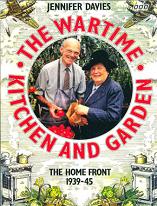
The Wartime Kitchen and Garden
Jennifer Davies
224 pages
published in 1993
I got this for my partner who's much more into gardening, cooking and social history than I am. Tanks and planes and proper military history is more my forte, whereas she likes to know how ordinary people lived through the war. The Wartime Kitchen and Garden was therefore right up her street, as it examines how rationing and the loss of overseas food supplies impacted wartime Britain, the problems it caused gardeners and cooks both domestic and professional and how they had to adapt to new demands made on them. This book was part of a BBC series of the same name, which I never saw as it was broadcast long before I had cable.
When World War II broke out in September 1939 Britain was for its food supply largely dependent on foreign sources; one way or another these quickly became unavailable. Some food sources were physically out of bonds through German occupation, the supply of others was made much more risky through increasing U-boat warfare, while the British government limited the supply of yet others, prefering to spent money and shipping space on tanks, planes and other weapons... Fortunately the British government wasn't entirely unprepared for this, having learned from the experiences in the previous war and immediately introduced rationing as well as replacement schemes to substitute foreign supplies with domestically grown food. Which meant that during the war the British people ate less, ate different foods and had to grow more of their own food themselves. Despite this austerity their dieet may however have actually been much healthier than it was before or since, just less fun...
The Wartime Kitchen and Garden is divided into fifteen chapters. The first four provide a general overview of rationing and the food situation in Britain during the war. This is followed by four chapters looking at how gardeners and gardens had to change, with the remaining chapters looking at the kitchen and home situation. The book focuses on just the war years, though rationing of course didn't end until well in the fifties. Personally I would've loved to know more of the post-war situation as well and how people coped with rationing once the reason for it had largely disappeared.
The way Jennifer Davies has set up the book is to intersperse the history of rationing with personal memories, for the most part those of the people featured in the television series: a gardener called Harry and a cook called Ruth. Each chapter introduces a specific aspect of rationing and then traces its consequences through the stories of Harry and Ruth, as well as various diary entries, contemporary books and magazine extracts and personal reminiscences of other people. This works well in bringing life to what could've been just an endless summation of dry facts, though it also means that much of the book is anecdotal in nature. Some depth is lost by this approach.
Nevertheless what comes through is the sheer organisation and work that was involved in Britain's wartime rationing efforts. It wasn't just the rationing itself, with its ration books and complex system of ensuring everybody got the best possible diet on the meager supplies available without wastage, but also the extraordinairy efforts needed to increase food production in the country itself and the massive efforts people themselves had to make to help in this increase. Head gardeners that were used to take care of the ornamental gardens of a country estate using a staff of perhaps ten to twenty people now had to retool those same gardens and glasshouses to produce food not just for the house but for redistribution with a much smaller workforce as the younger men got called up into service. Cooks meanwhile, both professionally and domestic had to make do with smaller amounts of the foods they were used to, as well as strange new replacements for those ingredients no longer available at any price. Extraordinary also the efforts of women, at home, but also working the land after the men had gone off to war, as well as in the wartime kitchens. What you get from The Wartime Kitchen and Garden is the sense that everybody in Britain during the war was thinking and dealing with food and getting it day and night, something largely unmentioned in popular fiction about the war.
I quite liked The Wartime Kitchen and Garden and now I wish I had been able to see the television series as well.